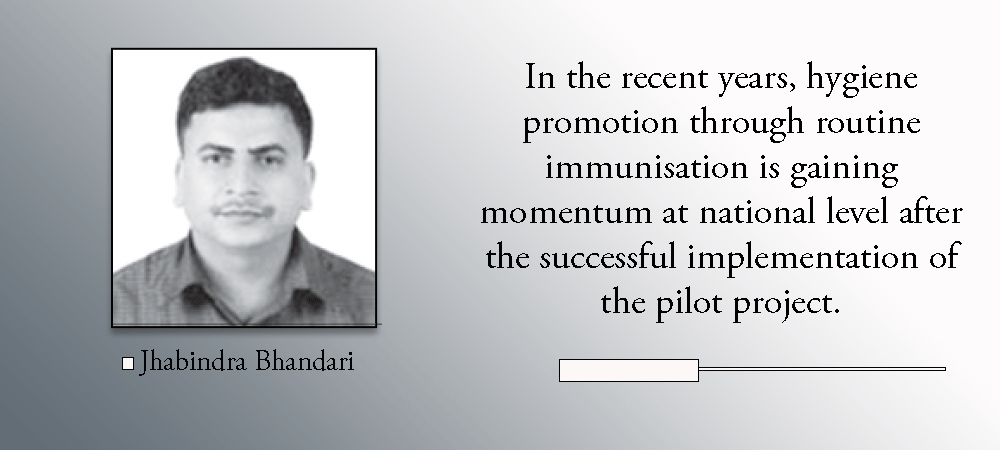- Wednesday, 25 December 2024
Water, Sanitation And Hygiene For All
Globally, safe drinking water, sanitation and hygiene (WASH) are critical to public health and social well-being. The global burden of diseases is attributable to unsafe WASH services. Diarrheal disease which is caused by contaminated food and water resources is a leading cause of child mortality and morbidity.
Moreover, it is also a major cause of malnutrition. More importantly, community-based WASH services greatly help prevent various diseases in the families and communities. The services largely contribute to livelihoods, school attendance and dignity and help create resilient communities.
According to WHO, as of 2020, 26 per cent of the worldwide population lack safely managed drinking-water services. Approximately 144 million people still collect drinking-water directly from surface water. Contaminated drinking-water is estimated to cause many diarrhoeal deaths each year, in addition to malnutrition and many other diseases.
Risk factors
Likewise, nearly half the world’s population lacked safely managed sanitation services in 2020. The evidence suggests that poor sanitation contributes to the spread of antimicrobial resistance and negatively affects broader well-being. Moreover, inadequate hygiene behaviours are important risk factors for infectious diseases like diarrhoea, soil-transmitted helminth infections, respiratory diseases and contribute to malnutrition and other diseases.
In many developing countries, lack of safe WASH negatively affects quality of life and undermines fundamental human rights. Poor WASH services also weaken health systems, threaten health security and place a heavy strain on economies. In March 2018, the Secretary-General of the United Nations launched a global call to action for WASH in all health care facilities. Health care facilities can instead contribute to more infections, prolonged hospital stays and preventable deaths, including of mothers and babies.
Considering the importance of WASH in health care facilities, WHO and UNICEF have developed tools and resources to support national and health care facility actions, including the recent launch of the new WASH Facility Improvement Tool (WASH FIT which includes elements of climate resilience, sustainability, gender and equity. This is increasingly considered as a means to support sustainable WASH and health care waste service improvements.
The WASH FIT is a risk-based, quality improvement tool for health care facilities, covering key aspects of WASH services such as water, sanitation, hand hygiene, environmental cleaning, health care waste management, and selected aspects of facility management. With the technical support from WHO, UNICEF, WaterAid and other partners, capacity building of health workers in the broader area of WASH FIT is in progress. However, this initiative needs to be further scaled up and strengthened with the active engagement of local governments in the federal context.
More recently, WHO Nepal and Department of Water Supply and Sewerage Management jointly convened a workshop on climate resilient sanitation safety planning training that aimed to enhance the capacity of relevant stakeholders on risk assessment and management related to sanitation systems, and sharing of experiences and learning from the national initiatives on sanitation.
The importance of WASH in health care facilities as well as communities is more pronounced during the COVID-19 pandemic. The evidences show that the safe WASH services strengthen the resilience of communities, and are critical to the delivery of safe and quality health services. Therefore, strategic intervention of WASH in health care facilities is highly cost-effective, and would yield substantial health benefits.
Again, practice of effective hand hygiene is critical to infection prevention in health care and community settings. While WASH is an integral part of health and health systems, there is an emerging need to focus on WASH in health care facilities, hand hygiene and WASH during the disease outbreaks and response plans. In the recent years, hygiene promotion through routine immunisation is gaining momentum at national level after the successful implementation of the pilot project which was initiated by Child Health Division under the Ministry of Health and Population with the technical support from WaterAid in four districts namely, Jajarkot, Bardiya, Nawalparasi and Myagdi in 2014.
More importantly, the project interventions largely focus on changing behaviours that aim to address broader social norms and culture by encouraging positive hygiene behaviours. The interventions primarily targeted mothers with children below one year and trained Female Community Health Volunteers (FCHVs) on range of multiple hygiene behaviours including exclusive breastfeeding, handwashing with soap, food hygiene, water treatment and few others in the families and communities.
Close association
There is a close association between gender and WASH in terms of women’s participation and menstrual health and hygiene. Lack of access to safe affects women and girls disproportionally, due both to biological and other socio-cultural factors. Disability is another social issue that needs to be addressed while providing safe WASH services in the communities.
“While there is significant progress in terms of implementation of this national initiative within broader health systems, it is crucial to enhance the effectiveness and continuity of the interventions at local level. Concerted efforts are needed to improve process monitoring of the interventions and measurement of the outcomes for tracking the progress.” says Sagar Dahal, Chief of Immunisation Section at Department of Health Services.
To sum up, achieving universal access to WASH in health care facilities should be a high priority agenda for actions at all levels. Therefore, integrating WASH into immunisation, nutrition, health emergencies, menstrual health and hygiene, and health care waste management offers enormous opportunities to address wider determinants of health for better health outcomes.
(PhD in global health, Bhandari writes on health and development issues.)














